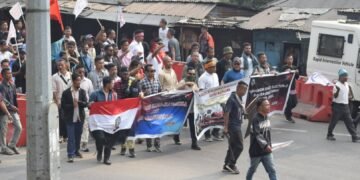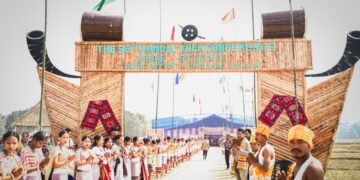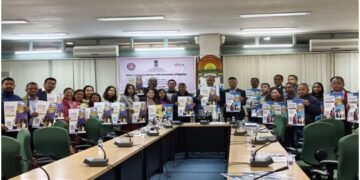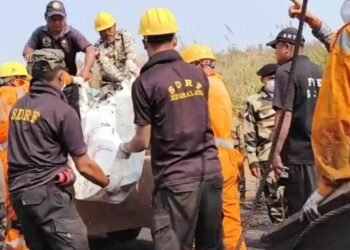Another prevalent issue is the irresponsibility and insecurity exhibited by certain Khasi men, possibly stemming from the loss of authority over their maternal family due to the misinterpretation of British law. These men often neglect their duties to their maternal family or fail to provide for their wives and children, indulging instead in lavish lifestyles, particularly through alcoholism. There is a common saying that Khasi men are unstable both at their maternal clan house and with their spouses, leading to domestic conflicts and even violence, especially when exacerbated by interference from in-laws or marital discord.
However, amidst these challenges, there are many young men and women who are responsible, dedicated, and contributing members of both their families and society. They work towards peace, prosperity, and communal harmony, demonstrating concern and pride for their respective communities. The coexistence of these diverse situations is typical in any society, with the aspirations of the majority taking precedence over the anxieties of the few.
Numerous other social anomalies compound the discrimination, deprivation, or disintegration of Khasi society, driven by greedy members within the community or unscrupulous migrants. These issues can be exploited by various factions to stoke communal disharmony and social disorder, potentially leading to serious political turmoil.
The rise of ethnic assertion coincides with the assimilation of local indigenous people into socially, economically, and culturally dominant communities. However, the rigid preservation of ethnic culture and traditions is often misguided, as the Khasi culture is dynamic and adaptable to modern civilization. Some Khasi elites and ordinary individuals prefer to identify with their fathers from other communities and adopt alien cultures, ignoring their own roots. This dichotomy between those who adamantly cling to tradition and those who blindly adopt foreign cultures only perpetuates ignorance and neglect in society.
Few rational individuals are concerned about potential social conflicts and advocate for change while remaining rooted in their heritage. However, they often struggle to make an impact as the more influential factions, driven by emotional manipulation, dominate public opinion. Thus, the future of any community will be shaped by its past deeds unless the present recognizes the need to stay on the right path or change course.
The process entails the evaluation and scrutiny of every individual action or collective endeavor within the community, culminating in a final verdict that metes out appropriate rewards based on the cumulative impact of these deeds throughout life. This concept mirrors the adage that “luck favors the brave,” suggesting that the destiny of each person or community is shaped by their own actions. It bears resemblance to the principles of Karma in Hinduism and Buddhism, albeit without the notion of reincarnation. In Khasi understanding, each person’s life is viewed as a unique entity in the temporal world, ultimately returning to become a part of the divine whole after death. Human bodies are seen as creations of the earth, emerging from the womb of their respective mothers and existing independently on earth for a finite period until destined to return and rejoin the collective essence of the earth.
Chapter 8: FREEDOM OF EXPRESSION
Freedom of expression is a fundamental aspect of personal and communal identity, reflecting subjective viewpoints within society. Each expression represents an individual or collective opinion, shaped by personal experiences and aspirations for well-being. However, conflicts may arise when differing opinions collide, necessitating adjustment, compromise, or reconciliation to achieve consensus and satisfy all parties involved.
Effective control over such conflicts requires empathy, compassion, and mutual understanding, both within domestic spheres and in public domains. Yet, navigating complex and volatile situations may challenge authorities to deliver just verdicts. In public spheres, citizens often seek justice from governing bodies, while within families, amicable resolutions are expected through consensus.
Unfortunately, instances of oppression may occur, where abuse of power leads to the imposition of specific codes of conduct by dominant figures, often fathers, within households. Chauvinism, prevalent in civil and domestic realms, fosters submissive attitudes among subordinates. Unlike in public arenas where change can be facilitated through democratic power struggles, family members, particularly housewives and children, may find themselves dependent on the head of the family for sustenance, thereby succumbing to his dominance without alternative recourse.
This dynamic is commonplace in many households, where economic security often takes precedence over emotional investment. Fathers, typically viewed as breadwinners, may overlook the emotional bond fostered by mothers within the family—a testament to the matrilineal system of clan lineage that prioritizes the nurturing role of women in the home. It is this essence that societies worldwide should strive to uphold.
In considering the pivotal role of mothers in society, it’s essential to recognize the multifaceted challenges they face. Modern housewives encounter difficulties managing domestic responsibilities, compounded for working mothers who must juggle both home and career. Despite these challenges, a mother’s embrace remains a source of emotional solace for her family, offering comfort to both children and their father during tough times or after long days.
Many mothers sacrifice their own feelings and aspirations, exhibiting remarkable tolerance for the sake of their families and children. Yet, in the pursuit of economic security for future generations, society often overlooks the immense sacrifices and affectionate gestures made by mothers. However, the present generation also includes mothers who assert themselves in familial dynamics, sometimes adopting roles traditionally associated with men and dictating terms to their husbands. Conversely, some may become careless or irresponsible due to pursuits of a more glamorous lifestyle.
In Khasi society, numerous single-parent households emerge from marital discord and interference from in-laws, often stemming from reckless and misogynistic husbands. These contemporary issues foster mistrust among family members, contrasting with earlier times characterized by obedient children and mutual trust between parents and offspring.
The matrilineal system, with its emphasis on the mother’s central role in domestic affairs for material, mental, and emotional nourishment, fosters a foundation of trust. In this structure, the father assumes the role of provider and protector of the family. It’s a universal trend for children to confide in their mothers, especially in moments of ethical deviation, while facing apprehension in confronting their fathers.
Respect for the father typically derives from his commanding presence, yet if demanded too forcefully, it may instill fear and distance within the family. Over time, such dynamics can lead to rebellion among family members. Thus, a delicate balance must be struck, where respect is earned through mutual understanding and compassion, rather than enforced through intimidation.
Hence, the concept of freedom of expression should be exercised with moderation and mutual respect within both family and society, preventing it from becoming excessively liberal and potentially causing embarrassment or disruption. In Khasi society, there have been instances where certain individuals or clans initially adopted patriarchal practices to align with prevailing norms, only to later revert to the original matrilineal customs due to social pressures. These instances of liberal thought often stem from Western influence rather than genuine ideology or tradition, leading to activism for social reform.
The patriarchal system, imposed by dominant cultures, often relies on economic superiority to exert pressure on minority groups, whereas the matrilineal system is seen as a more natural and beneficial social practice for the welfare of society. Notably, even affluent families or influential Khasi clans adhere to matrilineal traditions, prioritizing the well-being of smaller clans within the community. Furthermore, social class or caste distinctions are strictly prohibited, and all clans are considered equal in spirit, including the royal clan. In this egalitarian ethos, a wealthy individual from a large clan will consciously uphold matrilineal principles, even if their spouse belongs to a minority clan within Khasi society.
In the Khasi language, specific terms distinguish between freedom and liberty, with “Laitluid” representing freedom within accepted norms and “Laitlan” signifying liberty that may extend beyond societal boundaries, potentially leading to antisocial behavior. This nuanced understanding highlights the distinction between objective and conscientious action (freedom) and subjective and carefree behavior (liberty) within the Khasi perspective. It may be summed up as freedom is restrained liberty, and liberty is anarchic freedom.

























